#and i don't mean like. just not grown. i mean ripe but they were tiny
Note
as I am sad and sick I would like to hear some nice things. Is there any Palestinian flora/fauna you wish everyone could see?
(Personally I'm a biiiiiig fan of the cedars as a tree lover, but I've never been fortunate enough to see one in person 😭 cedrus libani... I will visit you one day...)
i hope you feel better soon!!
i don't know much about flowers in general but palestinians are very big on fruits. most palestinians grow a few fruit trees around their houses, and if they own some acres then they often have stuff like olive trees or palm trees. whenever you go to a downtown of a city, you can usually find stands upon stands of fresh fruits and flowers and whatnot. we're really also into nuts, and we spice and season nuts as a snack as well.
my grandpa has a small house in jericho, and he grows many trees of fruits around his home. he mostly grows figs, which are usually ripe when we come over so we can pick them right off the tree and eat it there. he also grows tiny oranges (?), about the size of a curled up pinky i think. you can usually pick them off the tree or bush and pop the whole thing in your mouth, even with the peel. it's kinda tart and i didn't like it very much, with it's textures and whatnot. i don't actually know if it's an orange, but it's definitely some sort of citrus. my dad said it might be called "kumquats" in english, but i just now got off the phone with my family in nablus and they said they called it "chinese oranges" in arabic lol. no one really knows what they're called but that's something that is easily grown around.
we have a LOT of palm trees, and usually if you're driving around the area you can come across many fields of palm trees and find dates. you can eat them before they're "ripe", when they're more round and yellow, and they're very sweet and delicious. in jericho, up on the mountain of the temple, you can look down on the city and see very long fields of dates being harvested. usually their harvesting season is around august/september (which means jesus would've been born in the summer since mary ate ripe dates when she birthed jesus lol), so if you go during the summer (by the way. jericho is BOILING during the summer. lowest place on earth, boiling hot. our car engine fucking MELTED WHILE WE WERE DRIVING) then you can find some really good fresh dates being served.
we just really love our fruits
#palestine#sorry it took so long to respond i called my family to ask what those lil oranges were called and then we got off track and talked for hour
70 notes
·
View notes
Note
May I request Epel, Ace, Deuce and Jack with a gardener reader that plants and grows her own fruits and vegetables?
Awww! little gardener Reader!
so sorry for the lateness on requests!! Trey has been busy with school again-
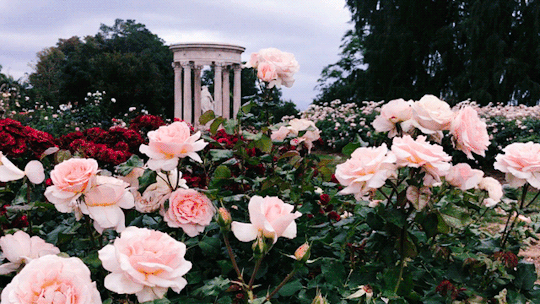
Ace
He pretends he doesn't care, but in reality, he thinks its really cute that you have your own little garden. There are times where he can't help but watch you wander around checking on your flowers and crops, watering them or pulling out weeds when needed. you sometimes bring him flowers freshly picked from your garden, and sometimes vegetables too. He now refuses to eat any kind of store bought vegetable. They have to be your home grown ones or he will not even lay a hand on that plate. He also enjoys your fruits as well, the cherries you grow always taste so sweet, and they're perfect for cherry pie, so if you can bake too, make sure you make him some, he'll love you forever after that! He also finds it so cute whenever you come back inside from gardening, and you've got dirt and grass all over you, he makes fun of you for it. (lovingly)
Deuce
He finds it so adorable! Also very convient as well, seeing as you don't really have to buy store bought vegetables or fruits, and the flowers are always so pretty to him. He's willing to help out in the garden if you ever need it. Need some plants watered fast? he's got his own watering can and is ready to help! Need help harvesting fruits? he's got a ladder ready to climb up and grab any high up fruits for you. Can't get some stupid weed out of the ground? He'll use his strength to pull it out for you! He's so helpful and you're always so grateful for it. He doesn't mind getting a bit of soil and dirt on his hands if it means he can spend time with you and help you out! He's also happy to recieve any flowers you give him, and he'll try his absolute best to take care of them well!
Epel
He's got a bit of experience in farming himself, seeing as he is from Harveston... which literally has "Harvest" in the name... Also slightly reminds me about Harvest Moon or Animal Crossing... He's especially experienced with dealing with the fruits, he'd be happy to help you out a bit, and he loves the apples that you grow so much, they always turn out so sweet and perfectly ripe. I'd like to imagine you have almost all 7,500 different varieties of apples growing in your lovely garden, and him being able to try all these different types always makes him happy and excited! Though he isn't particularly experienced in the flowers department, if you gift him any from your garden, he'll try his best to care for them!
Jack
Seeing as he has his own cacti, he must know quite a bit about gardening, so I'm sure he wouldn't mind helping you if you asked him nicely. Need the plants watered? Sure, he can help. Stupid weeds again? He's got it covered. He also enjoys the large assortment of fruits and vegetables you have. He always makes sure to come by for some food every now and then, he just can't resist the taste of your home grown foods! If you were to give him flowers, he'll take care of them as if they were his own children, and if they do wilt... he'll be sad...
☆☆☆☆☆☆☆☆☆☆☆☆☆☆☆☆☆☆☆
Fun fact about Trey... Trey also has their own tiny garden around their house- its been unused for a few years now tho
#twisted wonderland#disney twst#ace trappola#ace trappola x reader#deuce spade#deuce spade x reader#epel felmier#epel felmier x reader#jack howl#jack howl x reader#garden#flowers!#:) <3#treytheslay
175 notes
·
View notes
Text
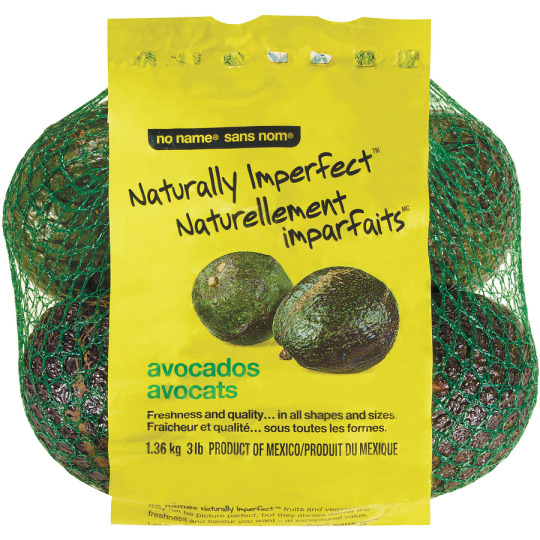
DON'T FUCKING BUY Naturally Imperfect Avocados!!!!
I fucking mean it! Biggest mistake of my life
I read about how most grocery stores don't accept any avocadoes from farmers that aren't a very specific size and weight which sucks because a lot of the really good ones (at least for Hass variety(?) or whatever) are the ones that are really big or really small. And that sucks. So when I see this bag of "fucked up looking or whatever the marketing is trying to convey" avocados I think "oh boy! I can get avocados for cheaper than usual AND they're probably going to be better!"
WRONG.
I don't even know if this is one of the varieties they typically sell in the store. Something is fucking wrong with them. I can't tell until I actually try to cut them open. For some reason it's just not working. I cut a circle around the outside then twist. Nothing. What in the fuck? It's like they don't have a pit!
Newsflash! They have these tiny fucking pits that meant I had to fucking caveman rip one open before I figured it out and then cut deeper into the next one. At first I was like "oh wow smaller pits. That means more flesh!" but what in the fuck because these bastards do NOT want me to scoop out their flesh. Like at all. I am fucking struggling over here. It's like they were removed from the tree way too early. The pits are tiny, the flesh isn't ripe, even though they are the correct black-ish ripe color. Wow wtf. So of course mashing them is a FUCKING NIGHTMARE. I'm sweating so bad I got sweaty balls from fucking MASHING GODDAMN AVOCADOS IN THE SUPPOSED COMFORT OF MY OWN HOME. Then I actually fucking make my guac and it TASTES LIKE ASS. BRUH. I COULDN'T EVEN FUCKING FINISH IT. YOU HAVE ANY IDEA HOW FUCKING MUCH I LOVE AVOCADO!? AND I COULDN'T FINMISH MY FICKING GUACAMOLE. i AM SCREAMING.
THEN THE ICINMG ON THR CAKE BECAUSE MY ROOMMATE TELLS ME THAT WHEN WE WERE AT CHECKOUT HE SAW THAT THEY COST MORE THAN IF i JUST GOT INDIVIDUAL AVOCADOS. THE REGULAR ASS KIND. HE DIDN'T THINK TO TELL ME THIS IN THE STORE. NO. AFTERWARDS OF COURSE.
i ASM SO FUCKING MAD
DO NOT BUY NATURALLY IMPERFECT AVOCADOS. BECAUSE THE REASON THEY'RE "IMPERFECT" IS BECAUSE THEY'RE FUCKING UNDERDEVELOPED OR SOME SHIT. I BET YOU FIVE HUNDRED THOUSAND DOLLARS ALL THOSE FUCKSHITS WHO GO "OH NOOOOOOOooooOOOOoo DON'T GROW AN AVOCADO TREE FROM THE PIT IT WON'T TASTE AS GOOD AS THE GRAFTED VARIETIES" ARE FUCKING WRONG AND THAT EVEN THE NASTIEST ASS GROWN FROM PIT AVOCADO TREE HAS FRUIT THAT AREN'T AS FUCKED UP AS WHATEVER THE HEL;L IS GOING ON WITH THESE MOTHERFUCKERS
I am grieving. I am crying and shaking. FUCK YOU.
0 notes
Text
today i pet a cat several times, picked some oranges & mandarins w/ my flatmate from the fruit trees, played minecraft on the new update and found an axolotl!!!!, watched twitch, napped in the sun streaming onto my bed, walked through the warm wet grass after it’d just rained and the sun had come out in jandals and had one of my favourite pasta dishes for dinner so i think i had a pretty good day
might even read a book to finish off the rest of the night in a good way
passing that energy along to everyone reading this. have an unexpectedly good day too!!
#we have so many fruit trees here#they're mostly citrus#there's lemons and oranges and mandarins and grapefruit and possibly limes and feijoas#that i've SEEN. i've only been around one part of this place rlly#but there's also variations within those ones#like i got two reasonable sized mandarins today but also there was a tree with little baby ones#and i don't mean like. just not grown. i mean ripe but they were tiny#i did try googling to see if they're a different citrus fruit but i think they're just little mandarins#there's a mandarin one right next to the cottage which is nice#lately my flatmate will be like hey do you want to come with me to- and i'm already out the door#i've simultaneously got excess energy and no energy#like i was getting way too little sleep by the end of the trimester so it's unsurprising i've been sleeping a lot#but half the time when i'm awake i'm ready to do a backflip and run a marathon. being inside is not good for that mood#currently getting sleepy @ 7pm lmao. i'll probably shower then read a book until i fall asleep. or i'll watch something#ohhh i should watch that playthrough of subnautica below zero on youtube ahh#decisions. i'll see what i feel like when that time rolls around
2 notes
·
View notes
Text
This man prefers you don't know his name. But he let our photojournalist into his world
Updated September 16, 2018 09:28:47
Map: Melbourne 3000
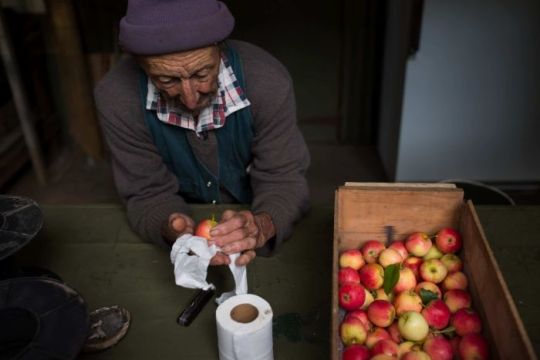
Photo: The old orchardist, who prefers to remain in obscurity, polishes one of the little apples he's spent more than 30 years quietly developing. (ABC News: Jane Cowan)
In a world gripped by 'go big or get out', he had a bold idea. Go small.
In patched jacket and faded beanie, the man treads across the paddock. His face, inscrutable. His diminutive frame tinier still against the towering messmates, the peppermints.
A black and tan kelpie trots ahead like a sentry, ears erect, tail high. The morning ritual. An old orchardist's early-rising habits die hard.
Between his fingertips, you know without looking there'll be the stub of a cigarette, hand rolled. The old butts accumulate in the pocket of his overalls.
He is not quite a recluse you can sometimes chance upon him at the local shopping centre. Or you might spy him walking the dog on a deserted oval. But he is beyond private.

Photo: Home is 17 slender acres in Victoria's Yarra Valley. (ABC News: Jane Cowan)
Never has there been a more reluctant hero of his own story.
Such is his aversion to the spotlight, his desire to avoid any kind of publicity, that between agreeing to tolerate my presence and this story nearing publication, he will insist his identity be withheld.
You will never know his name. You will hardly get a good look at his face. This is a man hiding in plain sight, even from the photographer.
That I am here at all is a miracle of spousal influence, though his wife also doesn't want to be known. Whenever I visit she performs a vanishing act of her own, staying inside or tripping off to the swimming pool in town.
God's country
'Here' is 17 slender acres tucked into the folds of Victoria's Yarra Valley.
On this undulating strip of land, man and wife neither from farming backgrounds made a life as orchardists. It was here they unearthed what became, for him at least, an obsession: reinventing the apple, in miniature. The little apples, as he calls them, the term of endearment embedded.
"If you take on a project like this, you have to become besotted," he tells me.
"If you half-heartedly go into it, it'll never succeed. So while you can, and while you're younger, you chase."
To observe him here is to be struck by the sense of a tiny god in his own beappled Garden of Eden, tending to creation.
It's exactly the kind of grandiose impression he doesn't want conveyed. He rejects anything that starts to sound like a romanticised account of his life's work.
But it's undeniable.
One big producer aware of the little apple describes it as a 'magnificent' achievement. Creating a new variety of fruit is a kind of holy grail for growers who are always looking for a unique product.

Photo: "If you half-heartedly go into it, it'll never succeed. So while you can, and while you're younger, you chase." (ABC News: Jane Cowan) 'A certain charm'
In the corrugated iron shed, the old orchardist leans on the counter, polishing a tiny apple with a swatch of toilet paper.
Packing instructions lean against the wall. A motorised pushbike is propped where the window light meets the shadow. It's aimed sometimes at the apple trees, full pelt, to scare off the parrots.
A conventional apple weighs 160, 170 grams, he's telling me. There's already a smaller variety on the market. But the old grower isn't perturbed. His is tinier still. At 44, 45 grams, it's a quarter the size of an ordinary apple.
He imagines it plated, whole, at a fine dining restaurant. On a cheese platter, perhaps. His wife sees it as a snack apple in school lunch boxes.
The orchardist doesn't like the term 'miniature' or 'mini'. Forget 'tiny'. Same goes for 'dwarf'. 'Baby' is unacceptable. ("Nobody eats babies.") 'Fairy' he particularly hates.
"No, see, they've all got connotations," he says.
For him, the word has always been 'little'.
"It's got a certain charm to it, right? One of the little people.
"But there's nothing wrong with being little," he adds, a twinkle in his eye. "I'm five foot two in my boots."
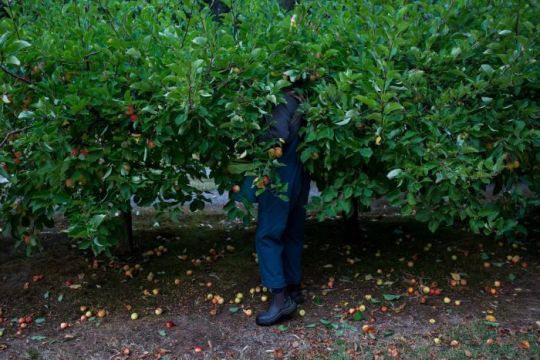
Photo: The orchardist's overalled legs and boots protrude from an apple tree during picking. As commercial fruit growers have scaled up, his small operation has become an anachronism. (ABC News: Jane Cowan) Believing
In the old man's book, people fall into two categories.
You're either a believer or a non-believer.
His wife is a believer, obviously. A partner, almost as steeped in the little apples as he is. Though the constant talk of little apples has become wearing, like a third presence in their marriage over the decades.
"She's been putting up with this since the 80s. Quite frankly I think she's sick of hearing 'apples'.
"If I mention the word 'apple' she's just as likely to throw a box at you. And I don't blame her."
A nearby commercial grower has told the orchardist he's wasting his time. Non-believer.
Fact is, the little apples have already been in some high places.
Big hotels and upmarket restaurants in Sydney and Melbourne. A fruit shop in Toorak. Stephanie Alexander took the little apples to the Melbourne Cup one year. They graced wineries, function venues. They were bottled and sold into David Jones. Exported to Asia.
The orchardist remembers one business meeting in the dining room of a swanky city high-rise, pianist tinkling in the corner. Coffee and biscuits delivered to the table. The head chef in his white gum boots.
The little apple was earning respect.
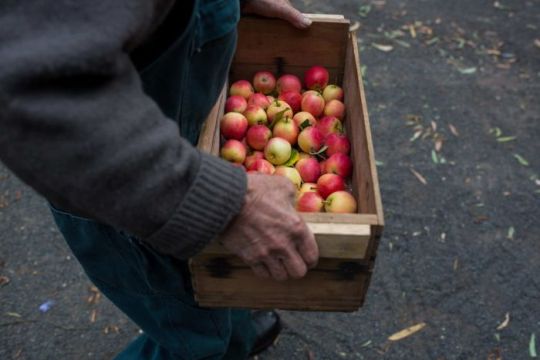
Photo: The orchardist handles his produce the old-fashioned way. By hand, in wooden boxes. The little apples are a quarter the size of an ordinary apple. (ABC News: Jane Cowan) Reinventing the apple
It all began with a hail storm. Necessity. Invention.
At the time the orchardist was in berries and cherries. Overnight, everything was shredded.
If he was to salvage an income for the following year, he needed to plant something else, pronto. "What can we plant?" he asked a friend who'd grown up on an orchard. "Zucchinis or tomatoes," came the answer, these fast-cropping annuals long the saviour of farmers in a pinch.
The orchardist's agent happened to have a spare 1,000 tomato plants. Cherry tomatoes.
Into the ground they went. The following year they were harvested and taken to market.
"They were brand new on the scene at the time and I could not grow enough of the things, could not pick enough to satisfy the market."
The orchardist's customers included Trans Australia Airlines, for in-flight meals on international routes.
The next year cherry tomatoes were everywhere.
But the experience had set an idea germinating in the orchardist's head.
"We tried to work out what we could grow that's different to ordinary, everyday.
"I don't like competition. I never enjoyed going to market, I could not deal satisfactorily with buyers on price, I hated haggling. I would set a price and if I didn't get it, half the time I'd bring the fruit home.
"I like to be a bit different. I was trying to get something in which there was no competition.
"And so we conceived the idea of the little apple to the big apple, applying the same principle as had worked with tomatoes."
Why not little oranges or little pears?
"Little pears had already been done, strangely enough. They were very delicate and came in little weeny packets with little pull-on socks, individually wrapped."
The snap of the lighter punctuates our conversation.
"But there was no little apple I'd ever seen. Everybody ate apples, you know, they were a universal, widely accepted fruit. So that's what we really thought."
From there on in, the trajectory goes something like this:
"We had the idea. We searched nurseries for a little edible apple. None available. We read books on horticulture that thick," he pinches the air, indicating three inches "No mention of a little edible apple anywhere.
"So we went and bought every crabapple tree variety you could find, and planted them. None were suitable to eat. So we had to start looking further afield."
Which meant roadside verges, football grounds, people's backyards.
"Anywhere there was an apple tree, we would grind to a halt. Ha.
"It had to have apples in it, to see what size they were. And sometimes you'd come a gutser because they'd turn out to be conventional apples with no water and no fertiliser and no thinning so they'd just grown pretty small."
But his best friend knew where there was one.
The location of that original little apple tree, the orchardist will take to his grave. Suffice to say, he got his hands on a sample.
He learned to bud and graft. He learned about root stocks and scions. And he learned how to wait.
Apple trees take four years to bear fruit.
"I can remember the trees. They were neglected because we just left 'em to grow because we were concentrating on earning a living off berries and cherries. Once we realised the fruit was at all saleable we'd have to pull them out of a big patch of grass and stuff."

Photo: The orchardist wrangles nets in preparation for covering the trees to protect against birds. Hail is another threat. (ABC News: Jane Cowan)

Photo: At 75, the physical labour involved in maintaining the trees has become harder to manage. (ABC News: Jane Cowan) From royalty cheques to fear of theft
Though he doesn't eat fruit ("Never have, even as a child."), the orchardist knows the subtleties of the little apple by touch and sight.
What it means when the leaves are curled. How a greasy skin indicates a little apple is ripe. To be sure by checking the colour of the seeds. Black, not brown. How to control the shape of a tree by choice of root stock.
Even when big names began picking up the little apple, though, it wasn't earning the orchardist the handsome living you might imagine. Fruit growing never did.
"We had one very good year. And it was on cherries. They were in short supply, and we had a crop.
"The rest of the time, oh well, we got by.
"Some years were so bad that my wife went to work in the general store, I went to work at other orchards."
But the little apples were being well received, and six years after the orchardist first dreamt them up the fruit was in steady demand. A niche market had been created.
The orchardist would leave home at two o'clock in the morning in a Morris Minor "loaded to the gills" and deliver his produce by hand in the city before driving back again and beginning work on the farm.
Later, when it got too much, there was a partnership with a big grower, and regular royalty cheques from the little apples.
But, after a decade, the big grower got out of apples altogether, re-entrusting the little ones to their creator.
Inventor became guardian.
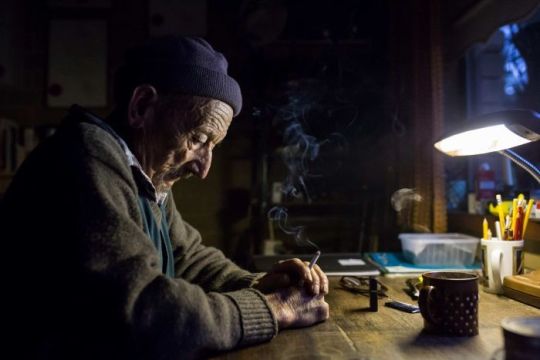
Photo: In his study the orchardist smokes and plots and worries. To this day he has trouble sleeping past 2am, the time he used to rise on market days. (ABC News: Jane Cowan)
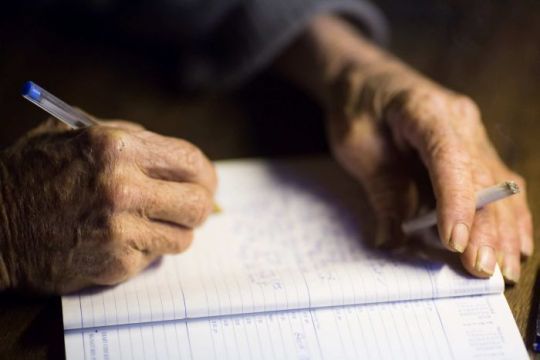
Photo: True to his surveying background, the orchardist has long kept meticulous diaries recording the details of life on the farm. (ABC News: Jane Cowan)
Inventing something brings with it a certain amount of anxiety.
"Part of the danger is theft of budwood," explains the orchardist.
"If you let strangers onto your property, especially growers who know, they're not beyond snapping a scion off a bush and waving the flies away and it goes down inside their shirt and when they get home, it's bloody well grafted and it's gone."
This fear is the reason for the string across the driveway, the draped coat whenever apple boxes are left in view in the back of the ute.
"Because once it's out, you've lost your exclusivity.
"At the moment you've got the exclusivity of the one I found and hopefully the parent tree I got it from has now carked it or disappeared off the face of the earth, so it's nowhere else but here."
Even the neighbours don't know about the little apples, the orchardist says.
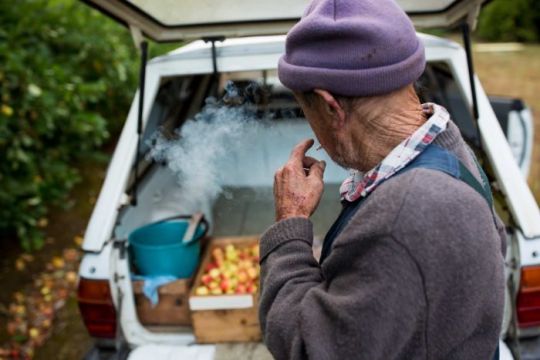
Photo: With scrapes from apple tree branches on his hand, the orchardist puffs on an ever-present cigarette as he loads his ute after picking. (ABC News: Jane Cowan) Buyer wanted
Growers never talk about selling fruit.
They talk about getting rid of it.
These days the old man's life is consumed with getting rid of the little apple.
Having closely guarded it for close to 40 years, he's now grappling with how to find a buyer, an heir to carry on what he started.
It's autumn and the little apples are blushing on the trees, carpeting the ground.
The orchardist boots one off the path, curses the birds.

Photo: The property has several dams, one spring-fed, which have provided irrigation for the fruit trees over the years. (ABC News: Jane Cowan)
His face is a contour map of wrinkles that seems to collapse upon itself when he's tired or worried, which he has been a lot lately.
For he is a man contemplating his own demise.
"It's a journey and the journey's coming to an end. I'm 75. I'm bloody lucky to get this far I'll tell you now."
In a globalised world, he doesn't use computers. Eschews technology.
He's approaching potential buyers one by one. He has a list.
He knows growers. But growing is not the same proposition it once was.
"Growing has changed to the point where you had to get big. You could no longer survive single handed, working an orchard.
"The margin per kilo is so small you've got to have a lot of kilos in order to make a living out of it, to cover your costs. And the only way you can do that is to plant an awful amount. More than what one man can handle.
"You've had to get to the point where you employ permanent labour or have large capital resources behind you. For cool rooms, forklift trucks. Everything was done by hand in the old days, into little wooden boxes you used to carry in and out of cool rooms. These days it's bulk handling, controlled atmosphere rooms they suck the oxygen out of. Enormous changes."
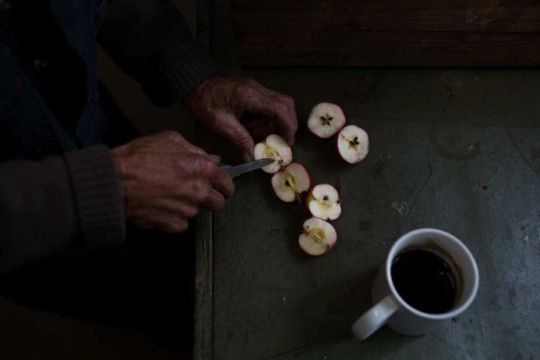
Photo: An apple fit for haute cuisine. In the packing shed the orchardist cuts open some of his crop to assess ripeness. (ABC News: Jane Cowan)
He imagines the perfect buyer to be a fresher version of himself.
"If I could meet somebody 40 years younger than I am, full of enthusiasm to take it up, I'd almost give 'em a kiss."
He thought someone with a roadside stall in a tourist area might be interested. They could sell direct to the public while supplying high-end restaurants.
But he approached one and couldn't get the time of day.
"I think the old days when people were more inclined to have a go are less around than they used to be."
Once upon a time governments were involved in breeding programs. Now, as far as the old orchardist can see, it's all private partnerships.
"I know of nobody in the research area in government that I could go to, and show them. I've written to people, I've sent little apples to people. I've got replies from them saying, 'It's a terrific idea, contact so and so' which I've already done, with no result."
A legacy, without anyone to bequeath it to.
"I'm still looking for a buyer. Because I don't know anybody to give it to, that's worthy of giving it to. And the trouble is, if I give it away, people won't value it and it's just as likely to get chopped down and lost.
"I had hoped to sell it and make some money. At my stage now, that's not so important. My more important thing is that all those labours are not lost."
Journey's end
Whatever happens, by year's end he'll be ploughing the trees in or cutting them down, pushing them into a heap and setting the whole lot ablaze.
He's decided he can't maintain the orchard beyond this season. The yearly netting brings on bouts of wheezing and the need to lean against a fence post. He requires help to do the spraying and the friendly nearby farmer, who's been doing it along with his own, is getting out of apples.
It's crystallised a deadline in the old orchardist's mind.
If he sells the little apple, then too the trees on his property will be burnt, to guarantee the new owner exclusivity. One way or another it all ends in burning.
His life's work, up in smoke.
"Don't feel sad about it because I'm not, okay?
"That won't hurt, nup. Won't worry me at all. Because that's a closure, that's the end. Yep and then there's other things. There's the kids, the dog. Yeah, plenty of other things. In some ways it'll be a relief."
I can't tell if he really means it. He's told me his life shouldn't serve as an inspiration to anyone, to other innovators. The way he tells it, throwing in his career as a surveyor to venture into fruit growing in the first place was not his smartest hour.
But he's also said he'd make the same choices again in the same circumstances. That it's been a way of life, far better spent outdoors than behind a desk, shuffling a stack of papers.
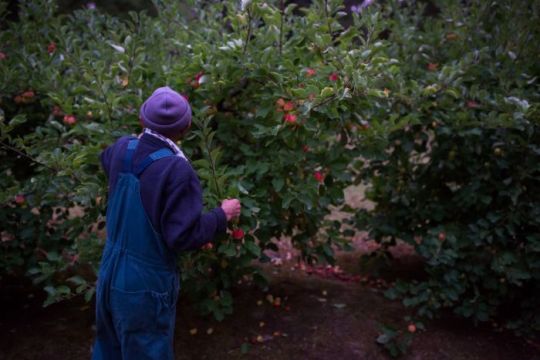
Photo: In the overalls he wears like a uniform, the orchardist inspects his beloved little apple trees. To innovate is easy, he reckons. To have enough capital behind you to turn a unique product into a commercial success is another thing entirely. (ABC News: Jane Cowan)
Don't give up your day job cannot be the epitaph to this story.
He invented an apple, dammit. Like God himself.
When I ask what crosses the old man's mind when it's just him and the apple trees, what the land means to him, he emits a rasp of a laugh.
"Ah, well, of course it's been everything for 40-odd years. You can't walk out the door without saying, 'Oh, I remember that.'
"I guess you do get attached to land, although nothing's permanent. The land is, probably. You'd hate to leave it.
"The little apple is not successful insofar as nobody's doing it and we've had trouble trying to sell it. That no longer troubles me at all. I'm quite happy now, just the fact that I've done it, that's enough.
"I don't measure things in financial success as you might gather, by the age of the cars and the age of the tractors and everything else."
Demise of the small family farm
When the old orchardist drives up and down the dips and around the whorls in his road he sees the landscape that's there, but also the one that used to be.
"When we started here in 1978 I think there were probably the best part of 20 small growers in the area."
Apples, mostly. Cherries. Lemons.
The bloke next door cultivated roses.
The berry grower across the road would be 90-something now, if he was still alive.
None of the children became involved in the farms, though, and the places were sold. Given over to paddocks with long grass and horses. Lifestyle properties.
"You know we tend to sling off at them but you shouldn't really because they're what's holding the whole place together. They cost an awful lot of money nowadays, so much money that you simply could not afford to buy the land to farm, to plant an orchard, if you wanted to. Just too expensive to buy. And so there's a lot of people who just enjoy the bush and the scenery."
A way of life, faded into history.
"Luckily I'm not doing it for a living anymore because what I'd miss is the bloke over the road to go ask him, 'How do I fix this problem?' Or the bloke down there who knows more than I do. Those days are gone where you are meeting fellow growers.
"Those people just gave you information, never held anything back. They'd give you plants, advice, everything. It was terrific, you know. No jealousy or 'here comes a competitor', nup.
"I've got one left up on the corner who I can talk to, and we can commiserate together about the weather."
As children, the orchardist's three sons would help with the picking, a play in the rowboat on the dam the reward for making it to the end of the row.
Now they have other lives, in other places.
"Not interested, full stop. None of them are growers in any shape or form. One of them might keep a little veggie garden but none of them are interested one iota. I'm glad because it's too hard."
It's shades of his own father, a bricklayer who would not teach his son to lay bricks.
"Dad used to come home of a night-time, sit in a chair and fall asleep, absolutely buggered. He was determined that I wasn't going to fall into the manual, hard physical labour like he did."

Photo: A hard-working life held in his shoulders, the orchardist pauses at the kitchen bench while boiling water for coffee, which he drinks black. (ABC News: Jane Cowan) Postscript
It's winter before the orchardist gets in touch with the news.
He's sold the little apple! Though keeping the details characteristically quiet.
Finally, our story ends, he writes.
With the sale of the business and the removal of the trees with the land back to pasture, we may now have the peace we seek.
Crosswords for him. For his wife, watercolours.
There will be life after apples.
For on the seventh day, He rested.
Topics:fruit,agricultural-crops,rural,fruits,lifestyle-and-leisure,gardening,science-and-technology,horticulture,edible-plants,fruit-crops,fruit-trees,agribusiness,community-and-society,inventions,melbourne-3000,vic
First posted September 14, 2018 14:25:26
http://www.abc.net.au/news/2018-09-14/orchardist-invents-little-apples/9369960
0 notes